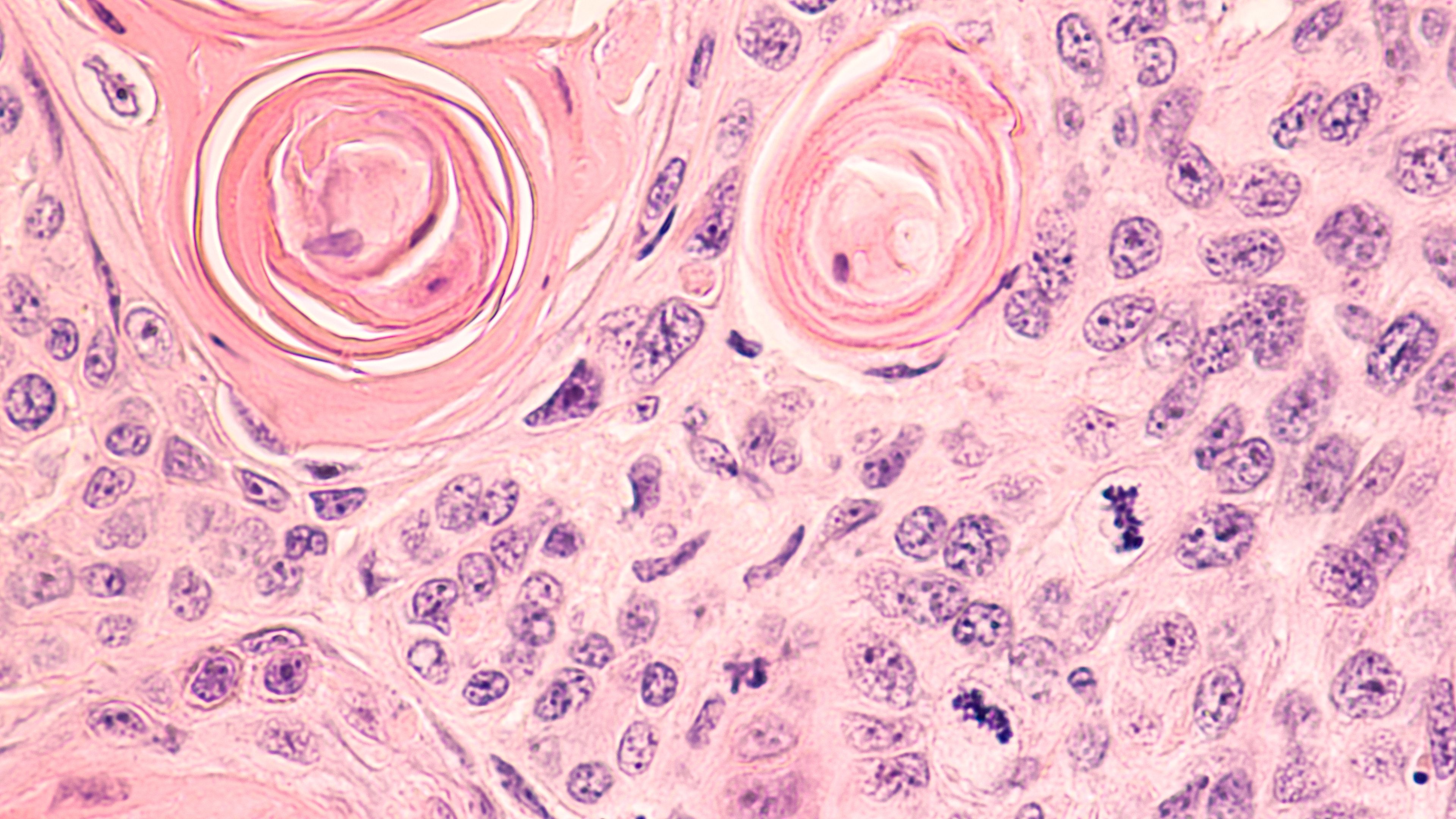TROPION-Lung01 Trial of Datopotamab Deruxtecan Meets PFS End Point in NSCLC
Progression-free survival data from the phase 3 TROPION-Lung01 trial showed that datopotamab deruxtecan as treatment of metastatic non–small cell lung cancer crossed the threshold for statistical significance.
Image Credit: © David A. Litman -www.stock.adobe.com

Datopotamab deruxtecan (Dato-DXd) led to a statistically significant improvement of progression-free survival (PFS) vs docetaxel for the treatment of patients with locally advanced or metastatic non–small cell lung cancer (NSCLC) who received at least 1 prior therapy, according to findings from the TROPION-Lung01 phase 3 trial (NCT04656652).1
PFS was evaluated as a dual primary end point along with overall survival (OS) in the randomized, phase 3 TROPION-Lung01 study, however, the data were not yet mature for OS. With these findings, an early trend was observed in favor of datopotamab deruxtecan vs docetaxel, the current standard of care chemotherapy, that did not meet the prespecified threshold for statistical significance at this interim analysis.
Looking at safety, the safety profile of datopotamab deruxtecan was consistent with previous clinical trials and there were no new safety signals identified. Interstitial lung disease of any grade was generally consistent with previous clinical trials, and the majority were low-grade. Additionally, some grade 5 events were observed among patients.
The trial will continue to assess OS with greater maturity with the investigators and participants remaining blinded to the results. Additional data will be presented at an upcoming medical meeting and shared with health authorities.
“We are encouraged by the statistically significant results of the dual primary end point of progression-free survival seen with datopotamab deruxtecan and look forward to the final overall survival analysis. We plan to share these data with regulatory authorities to discuss next steps,” said Ken Takeshita, MD, global head, oncology research and development, Daiichi Sankyo, in a press release.
Datopotamab deruxtecan is a specifically engineered TROP2-directed DXd antibody drug conjugate that is being developed by AstraZeneca and Daiichi Sankyo and studied in the phase 3 TROPION-Lung01 trial.2
Patients are eligible for enrollment in the trial if they have NSCLC with and without actionable genomic alterations, such as EGFR and ALK. Patients must be aged 18 years and older, have a life expectancy ≥3 months, an ECOG performance status of 0-1 at screening, and actionable genomic alterations must have been previously treated with platinum-based chemotherapy and an approved targeted therapy. Additionally, patients without actionable genomic alterations are required to be previously treated, concurrently or sequentially, with platinum-based chemotherapy and a PD-1 or PD-L1 inhibitor.
The study is evaluating datopotamab deruxtecan at a dose of 6.0 mg/kg vs docetaxel 75 mg/m2. The dual primary end points of the study are PFS and OS. Secondary end points include PFS, objective response rate, duration of response, disease control rate, time to response, time to deterioration, safety, and pharmacokinetics.
“With TROPION-Lung01, we met the dual primary end point of progression-free survival, challenging the entrenched standard of care in a previously treated and unselected patient population that has long deserved an alternative to chemotherapy. These first phase 3 trial results from the datopotamab deruxtecan clinical programme provide compelling evidence for the potential role this TROP2-directed antibody drug conjugate can play in treating patients with lung cancer,” said Susan Galbraith, executive vice president, oncology research and development, AstraZeneca, in a press release.1
REFERENCES:
1. Datopotamab deruxtecan met dual primary endpoint of progression-free survival in patients with advanced non-small cell lung cancer in TROPION-Lung01 phase III trial. News release. AstraZeneca. July 3, 2023. Accessed July 5, 2023. https://tinyurl.com/2wkuxa6d
2. Study of DS-1062a versus docetaxel in previously treated advanced or metastatic non-small cell lung cancer with or without actionable genomic alterations (TROPION-LUNG01). ClinicalTrials.gov. Updated July 4, 2023. Accessed July 5, 2023. https://clinicaltrials.gov/study/NCT04656652
Roundtable Roundup: Lung Cancer Molecular Testing and ALK-Targeted Treatment
January 18th 2025In separate, live virtual events, Vincent K. Lam, MD, and Chul Kim, MD, MPH, discuss molecular assays and treatment options for a patient with metastatic non–small cell lung cancer (NSCLC), with participants.
Read More